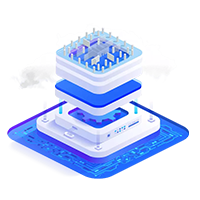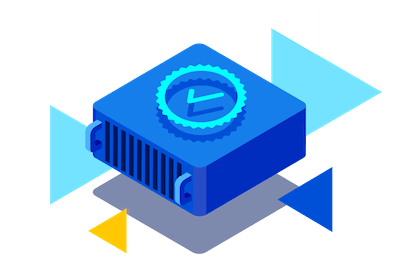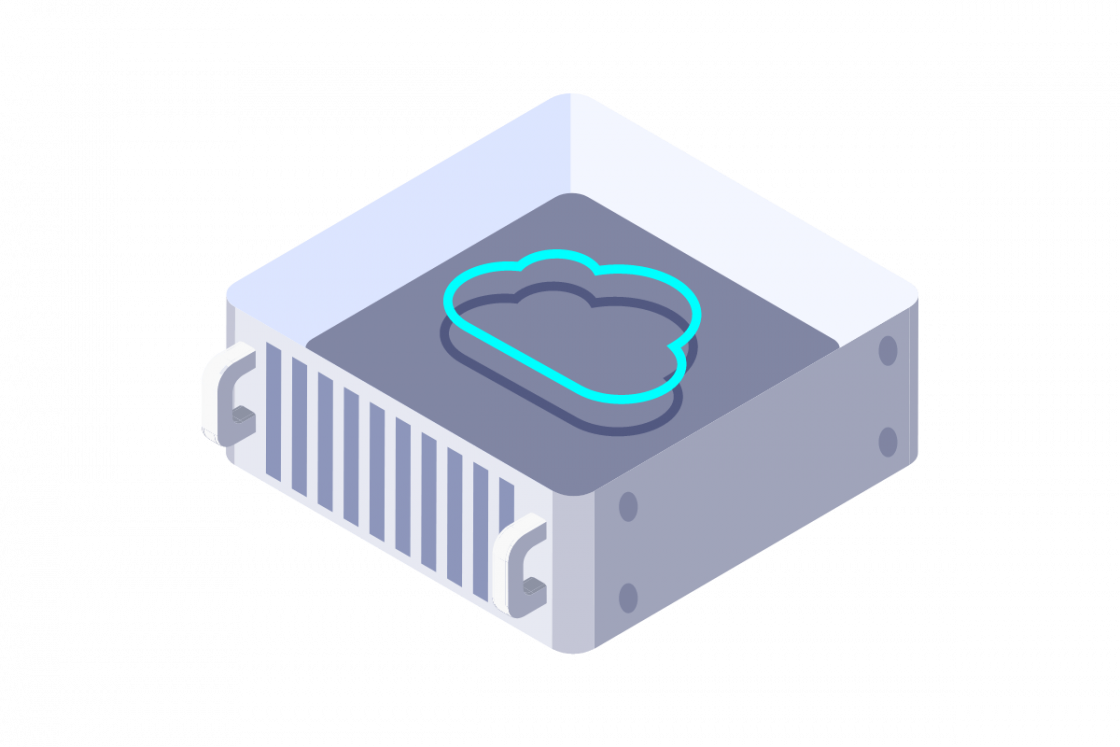What is Virtual Dedicated Servers
To grasp the concept of virtual dedicated servers (VDS), it's essential first to understand the foundations upon which they are built: virtual and dedicated servers. Let's break down each of these.

Virtual Servers Overview
Imagine a powerful physical server, a real machine with substantial processing power, memory, and storage. Using hypervisor software, we divide this physical server into multiple isolated environments. Each isolated environment acts as an independent server, a virtual server, or a virtual machine (VM).
Think of it like partitioning a hard drive. You're dividing one physical disk into multiple drives, each with its own file system and operating system. Similarly, a hypervisor divides a physical server into multiple VMs, each with its own operating system, applications, and resources.
Virtual servers offer several advantages. Multiple virtual servers can run on a single physical server, maximising hardware utilisation. Sharing hardware resources reduces the expense of having separate physical servers for each application.
Resources (CPU, RAM, storage) can be easily adjusted, allowing for quick scaling up or down. Virtual servers can also be easily backed up and migrated to another physical server in case of hardware failure.
Dedicated Servers Overview
In contrast to virtual servers, a dedicated server is a physical server exclusively assigned to a single user or organisation. This means that the server's capabilities (processing power, memory, storage, bandwidth) are exclusive to that single user.
These can offer the highest level of performance and are ideal for resource-intensive applications. They also provide high safety and control over the server environment since no other people share the resources.
Users have complete oversight over the server's hardware and app configuration, allowing customisation to meet specific needs. By understanding the core concepts of virtual and dedicated servers, we can better appreciate how virtual and single-tenant servers combine the best of both worlds.
The Concept of Virtual Dedicated Servers
It represents a clever blend of virtualisation technology and single-tenant hosting, offering a unique solution that caters to specific cloud server hosting needs.
Combining Virtualisation and Dedicated Hosting
While residing on a physical server shared with other virtual servers, a VDS is allocated reserved resources (CPU cores, RAM, storage) not shared with other users. This guarantees consistent performance regardless of the activities of different virtual machines on the same physical machine.
Like a single-tenant server, it operates in complete isolation. It has its own operating system, applications, and reserved resources, ensuring that activities on other VMs do not impact its speeds or security.
Users have full root access to their hosting, allowing them to manage the server environment completely, including software installations, configurations, and cybersecurity settings.
This combination creates a powerful hosting platform that combines the performance and fine-grained management of a single-tenant machine with the flexibility and cost-effectiveness of virtualisation.
Differentiating from Cloud and Shared Hosting
While it shares similarities with cloud, hybrid cloud, and collective hosting, key distinctions exist. It has exclusive resources, while cloud hosting typically utilises a pool of hardware shared among users. This can lead to resource contention in cloud environments during peak usage.
VDS gives greater customisation and oversight over the server platform than most cloud hosting solutions. It usually has a fixed monthly cost based on the allocated resources, while cloud hosting often follows a pay-as-you-go model based on actual resource consumption.
In contrast, in shared hosting, multiple companies share the same server and its resources, leading to potential performance limitations and cybersecurity concerns. VDS provides exclusive resources and isolation, eliminating these issues.
Shared hosting offers limited control over the environment. It provides root access and complete control. Scaling in shared hosting is often restricted, but it allows for more effortless scalability to accommodate changing needs.
VDS bridges the gap between collective hosting and dedicated servers, offering a balance of affordability, performance, and oversight ideal for businesses with moderate to popular web presences and applications.
Resource Allocation and Management in VDS
One of the key strengths of VDS options lies in their flexible cloud hosting resource allocation. Unlike shared hosting environments where resources are a communal pool, VDS provides an exclusive slice of the server's power—CPU cores, RAM, and storage—just for your use.
You are guaranteed access to these resources, ensuring consistent performance regardless of other clients' activities on the same physical server. You won't have to worry about noisy neighbours or sudden speed drops during peak hours.
This exclusive resource allocation provides a predictable and stable environment, giving you the confidence to run demanding apps and host high-traffic sites without fear of resource contention.
Furthermore, cloud solutions offer a level of agility that traditional dedicated machines often lack. Most providers provide easy scalability, allowing you to adjust your capacity on demand as your requirements evolve.
Whether you experience a sudden surge in traffic due to a successful marketing campaign or need more processing power for a new application, you can quickly scale your VDS to match your requirements.
Virtual Dedicated Servers in Web Hosting
Virtual dedicated servers have become increasingly popular in the hosting landscape. They offer a compelling solution for businesses seeking a balance of performance, security, and affordability.
Benefits of Web Management
VDS provides several key advantages for managing websites:
- Enhanced performance: With exclusive resources, it ensures consistent speeds even during traffic spikes. This translates to faster loading times, improved user experience, and better search engine rankings.
- Increased security: The isolated nature enhances cybersecurity by protecting sites from vulnerabilities and malicious activities that might affect other clients on a shared server.
- Greater control: Root access allows complete 360-degree management of the server environment, enabling web administrators to customise settings, install the necessary software, and implement cybersecurity measures tailored to their specific needs.
- Improved scalability: VDS is easily scalable, allowing businesses to quickly adjust resources (CPU, RAM, storage) as their website traffic and resource demands grow.
VDS is a more affordable alternative that offers similar speeds and management benefits. Therefore, it is an attractive option for businesses seeking to optimise their hosting costs without compromising quality.
Hosting Multiple Websites on VDS
One significant advantage is hosting multiple websites on a single server. This is particularly beneficial for businesses managing various sites or offering web hosting services to clients.
With VDS, you can allocate specific resources to each site based on its requirements and traffic levels. This ensures optimal speeds for all sites hosted on the server.
Each website operates in its own isolated environment, ensuring that security vulnerabilities or speed issues on one website do not affect others. Hosting multiple sites on a single machine streamlines management tasks, reducing administrative overhead and complexity.
Consolidating multiple web presences onto a single VDS can lead to significant cost savings compared to hosting each website on a separate server. By leveraging VDS's capabilities, businesses can effectively manage multiple sites with enhanced performance, security, and control, all within a cost-effective framework.
Setting Up and Managing a VDS
While VDS gives greater control and flexibility than shared hosting, it also comes with greater responsibility. You'll typically have root access to your server, which means you're in charge of configuring the OS, installing software, and managing security.
Many providers offer control panels and management tools to simplify these tasks, but a basic understanding of server administration is still beneficial. You'll need to handle software updates, security patches, and backups to ensure your VDS's smooth operation and security.
However, this management level also allows for customisation and optimisation to meet your specific requirements.
You can tailor the server to match the requirements of your applications and websites perfectly, fine-tuning every aspect for maximum performance and efficiency. This level of granularity can be particularly valuable for businesses with unique requirements or those seeking to optimise their servers for specific applications.
OVHcloud and Virtual Dedicated Servers
Are you looking for the power and flexibility of a single-tenant server but not sure where to start? OVHcloud provides a range of bare metal solutions to suit your goals, whether you're looking for complete control over your infrastructure or the convenience of managed services. Explore our options below to find the perfect solution for your business.

OVHcloud Dedicated Servers
We offer various configurations to meet any business's requirements. Choose from multiple operating systems, SSD and HDD options, and network connectivity to build your ideal environment. With our high-availability infrastructure and 24/7 support, we can keep your business running smoothly.

OVHcloud Bare Metal Servers
Our bare metal machines give you complete control over your infrastructure. With private resources and no virtualisation overhead, you can optimise performance for even the most demanding workloads. Choose from various configurations to build your ideal platform and scale as your goals evolve.

VPS from OVHcloud
OVHcloud VPS is a great way to get started with your server. VPS stands for a virtual private server. With this service, you get a dedicated virtual machine. Different configurations are available for things like storage, RAM, and CPU. You can host a website, host a game server, or use your VPS for streaming. There are a variety of operating systems to choose from. You also get DDoS protection.